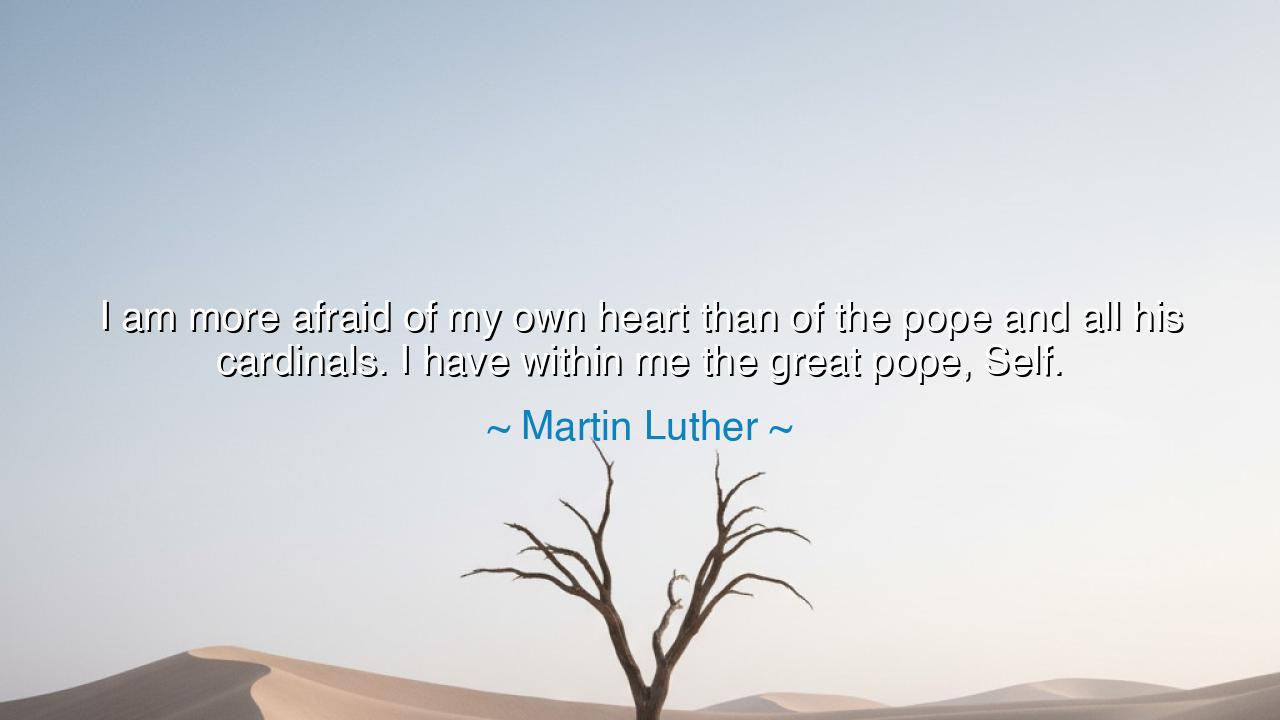
I am more afraid of my own heart than of the pope and all his
I am more afraid of my own heart than of the pope and all his cardinals. I have within me the great pope, Self.






“I am more afraid of my own heart than of the pope and all his cardinals. I have within me the great pope, Self.” Thus spoke Martin Luther, the fiery reformer who stood against the thrones of power and the weight of empire, yet confessed that his greatest enemy was not Rome, nor the Church, nor the rulers of his age—but the restless tyrant within his own breast. In this confession lies a wisdom older than time: that the mightiest battles are not fought upon fields of blood or beneath cathedral spires, but within the silent chambers of the human heart.
Luther, who defied the Church’s might and ignited the Reformation, knew well what it was to confront the powers of the world. He stood before the Diet of Worms and declared, “Here I stand, I can do no other.” Yet even he, who stared unflinching at kings and inquisitors, trembled before the secret force within—the voice of ego, of pride, of self-righteousness. For he knew that the heart, when unexamined, becomes its own false pope—issuing decrees, commanding desires, and anointing itself with infallibility. The heart can sanctify its own corruption, calling sin virtue and vanity holiness. Thus Luther’s words were not of fear, but of recognition—the recognition that the greatest tyrant is the self that believes it is right.
The ancients spoke likewise. Socrates, who was called the wisest of men, declared that the unexamined life is not worth living. The Stoics warned that the mind, when enslaved to passion, makes a man his own oppressor. And the Scriptures themselves cry out, “The heart is deceitful above all things, and desperately wicked: who can know it?” Luther, standing in that long lineage of spiritual warriors, understood this truth. It is easy to name enemies without, to cast blame upon popes and princes. It is far harder to confront the quiet deceiver within—the Self that hungers for glory, control, and justification.
Consider the tale of Marcus Aurelius, emperor of Rome and philosopher of wisdom. Though he ruled the world, he wrote nightly in his journal to remind himself that his true kingdom was not the empire, but his own soul. “Conquer thyself,” he wrote, “and thou shalt conquer all.” He knew, as Luther did, that the most dangerous crown is the invisible one—the crown we place upon our own thoughts. For pride can make a pauper feel like a god, and humility can make a god remember he is dust. To govern oneself is the highest and hardest mastery.
In every age, men have sought to overthrow tyrants, yet few have sought to overthrow the tyranny of Self. It whispers to us that we are always right, always justified, always victims. It cloaks selfishness in noble words, and ambition in the guise of destiny. This is the great pope within, the false pontiff who blesses every indulgence of the ego. Luther saw it in himself and trembled. For if a man cannot rule his own heart, how shall he stand against the world?
What, then, is the lesson of this wisdom? It is to live in self-examination, to be ever watchful of the heart’s subtle pride. When anger rises, ask, “What do I seek to protect—truth or vanity?” When envy stirs, ask, “Whose approval do I crave—the world’s or my own?” When righteousness burns too brightly, ask, “Do I serve justice—or merely my image of it?” These questions are the sword and shield of the soul, guarding it against the invisible despot within. To know oneself is to begin the work of freedom.
And yet, this is not a call to despair, but to courage. For to face one’s heart is the bravest act of all. The ancient heroes battled monsters and armies; the wise battle the illusions within. To defeat the Self is to open the door to grace—to humility, compassion, and truth. Luther, in his humility, saw that victory begins not with rebellion against others, but with repentance within oneself.
So remember, O listener of the ages: fear not the rulers of men, nor the judgments of the world, but fear the silent arrogance that dwells within your own soul. For when you master the heart, you have conquered the fiercest empire of all. And from that mastery shall flow the purest strength—the strength of one who kneels not to pride, but to truth.






AAdministratorAdministrator
Welcome, honored guests. Please leave a comment, we will respond soon